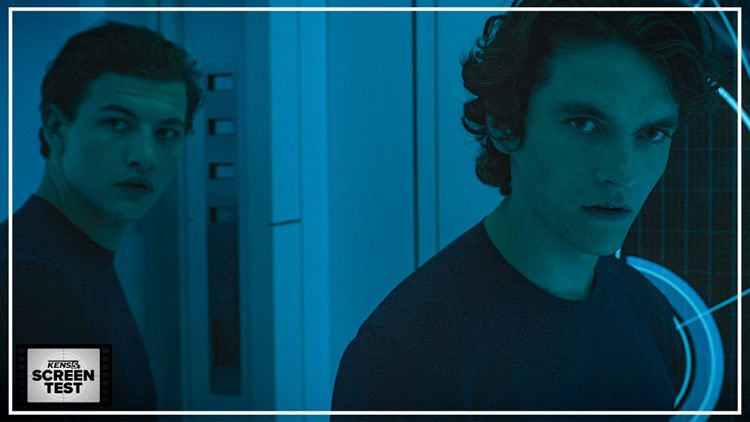[[Note: When "Voyagers" releases in the U.S., it will largely be at indoor movie theaters during the ongoing coronavirus pandemic. While the purpose of this review goes deeper than binary recommendation to discuss the film's merits as an artistic work in context of its time, we encourage our readers to continue exercising the latest safety guidelines from health authorities and consider them if and when you may decide to visit the cinema to watch this movie.]]
Bursts of recognition pepper the experience of watching “Voyagers,” and it perhaps says all you need to know about this rather stale space-set science-fiction’s degree of memorability that the most exciting of these moments pertain not to the drama, but to our noticing the faces among its ensemble cast. Wait, is that Bran Stark? And is that the kid from “Blinded by the Light”?! Didn’t expect to see one of those unfortunate souls from “Midsommar” in this. Nice to see the soldier from “Dunkirk” hop across genre boundaries! Ahh, I see two scenes is enough for Lily Rose-Depp to nab more lines than the entirety of “The King.”
Enlisting Tye Sheridan to lead the way – perhaps the most recognizable face in the bunch, and the one with the most rotations through the blockbuster machine via “Ready Player One” and the “X-Men” franchise – “Voyagers” unites a team of young almost-A-list actors for a movie about deadly teen tribalism set against the most aesthetically generic of interstellar backdrops and narrative foundations. The year is 2063 and Earth is dying (our species’ expiration date sure seems to loom closer and closer for Hollywood’s scribes, doesn’t it?), so an initiative is underway to launch a crew of youngsters onto an 86-year voyage to colonize the closest habitable world. Ten years later, they’ve gone from puppy-dog cute to robotic-drone emotionless, barely able to register the inner peril fueling an offhand realization that “our lives are unimportant.”
Maybe it’s the strange blue stuff they’ve been gulping down for the last decade that’s restrained their every urge, from the physical to the primordial. Maybe simply dumping it down the drain one morning will awaken some pharmaceutically suppressed free will. And maybe, juuuuust maybe, there’s nothing quite so unpredictable as a bunch of teenagers suddenly discovering they can be in control if they simply act on their wanting to be.
Funny enough, what happens in “Voyagers” is actually pretty predictable. The plot beats tick away like clockwork, which would be fine if writer-director Neil Burger’s script actually translated what’s at stake—namely, the future of humanity. But that’s a big ask when Burger barely lays the groundwork for these characters and the mental imprisonment they initially seek to break free from. The result: A story so metronomic in its structure and pacing that we’re left wondering whether the future of the human race is even worth giving much of a damn about. The movie is modestly effective as metaphor – its literary inspirations couldn’t be more obvious if the starship were called the William Golding – but “Voyagers” makes a dull case for the reliable Hollywood storytelling strategy of transplanting classic tales to new settings. That’s all the more disappointing given the richness of potential in the script’s conceit about kids involuntarily pushed into the position of crossing the cosmos, all while it’s their grandchildren who will know what it’s like to make life on a new homeworld.
Intriguing questions are immediately poised, not the least of which is considering: To what extent is humanity inextricably linked to humanity’s home planet? Burger keeps the philosophizing to a minimum, which is a shame; “High Life” and “Ad Astra” prove there’s still plenty to learn when it comes to reckoning with our fascination with the stars, while “Voyagers” thinks the familiar amounts to the profound. Then again, Burger’s dour dialogue keeps the excitement from ever completely lifting off, leaving his performers with extremely little room from which to show off dramatic chops.
Burger’s collaborators give a noble effort to spark frenzied style amid the proceedings, and it’s most acute as the young crew begins to relish their newfound rebellion and self-discovery. As Enrique Chediak’s camera whirls and twirls around the ship’s sleek white interiors, the crew sprint, howl and jump through the frame as if part of a choreographed maniacal tango. It’s a potently energetic montage reflective of some later sequences emphasizing the increasingly dire situation following the crew’s requisite splitting into factions, but even here Burger seems to forget his story is unfolding in outer space’s silent, dark vacuums in spots. Sheridan’s heroic Christopher and Fionn Whitrock’s darkly menacing Zac (Whitrock's work here actually gets under your skin) can only slip so far into their yin-and-yang archetypes before we realize the implications of their struggle beyond violent squabbles. Bizarrely, “Voyagers” doesn’t seem much interested in that side of its premise at all.
"Voyagers" is rated PG-13 for violence, some strong sexuality, bloody images, a sexual assault and brief strong language.
Starring: Colin Farrell, Tye Sheridan, Lile-Rose Depp, Fionn Whitehead
Directed by Neil Burger
2021
MORE REVIEWS:
- ‘Moffie’ Review: A gorgeously grim story of apartheid-era suppression
- ‘Slalom’ Review: Frostbitten French drama examines abuse in the world of amateur athletics
- ‘The Unholy’ Review: An invocation for a mostly forgettable faith-themed horror mystery
- ‘Godzilla vs. Kong’ Review: A blockbuster to make up for a year of lost blockbusters
- ‘Better Days’ Review: Evocative anti-bullying PSA isn’t much interested in being an anti-bullying PSA
- ‘Nobody’ Review: Bob Odenkirk breaks very, very, very bad in ultraviolent revengepedition
- 'Come True' Review: Nightmarish premise sleepwalks through the payoff



